
Table of Contents
Related Articles


Bank Account Opening for Russian Nationality in UAE

Why External Audits Matter for Free Zone Businesses

Let's Talk
Sign Up For Free Consultation
What is Internal Audit? A Complete Guide
Internal auditing is a systematic process that involves examining and evaluating a company’s records, workflows, systems, and processes. This multifaceted approach goes beyond mere financial assessments; it delves into the very fabric of an organization, scrutinizing every layer of its operations to ensure that they align with established policies and regulatory standards. An internal audit team conducts a thorough analysis of financial documents and company records to uncover areas that require improvement, thereby fostering operational efficiency and accountability.
By meticulously reviewing financial statements, transaction records, and internal controls, the internal audit team can identify compliance issues that may arise from non-adherence to laws and regulations. This proactive stance is vital, as it helps mitigate potential risks that could jeopardize the organization’s integrity and reputation. Furthermore, internal auditors assess risks related to business processes, identifying vulnerabilities that may be exploited by fraudsters. Their investigations encompass both internal fraud, such as embezzlement or misappropriation of assets, and external fraud, including cyberattacks and vendor fraud.
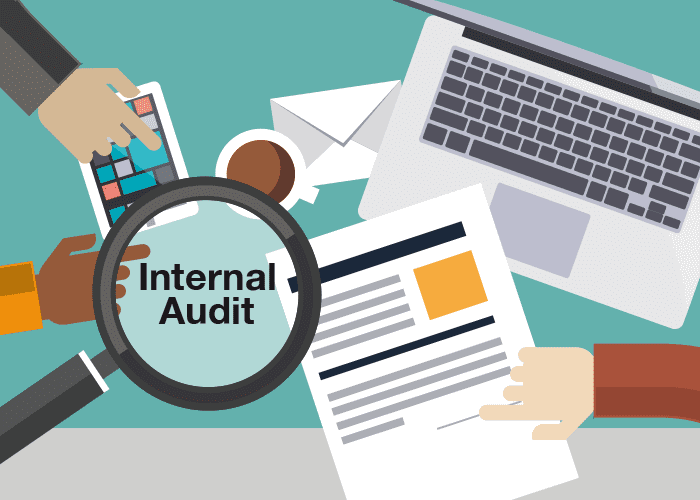
Internal auditing plays a critical role in pinpointing inaccuracies in financial reporting, which can have serious implications for a company’s financial health and stakeholder trust. These inaccuracies may stem from inadequate internal controls, misinterpretation of data, or even intentional misconduct. By detecting these discrepancies early, internal auditors help organizations avoid potential financial losses and maintain transparency.
This comprehensive guide will provide you with a deeper understanding of what internal audit entails, highlighting its crucial value to organizations and outlining the key steps involved in the audit process. Internal audits serve not only as a means of ensuring compliance but also as a strategic tool for enhancing overall organizational performance. The insights gleaned from the internal audit process can inform decision-making at the highest levels, guiding management in their efforts to optimize resources and streamline operations.
Moreover, effective internal audits foster a culture of accountability within the organization. When employees understand that their work is subject to review, they are more likely to adhere to policies and procedures, ultimately promoting ethical behavior and integrity. As businesses navigate increasingly complex regulatory environments, the role of internal auditing becomes ever more significant. This guide aims to equip you with the knowledge and tools necessary to appreciate the value of internal audits and understand their impact on organizational success. By embracing a robust internal audit function, organizations can not only safeguard their assets but also enhance their ability to achieve strategic objectives.
What is Internal Audit?
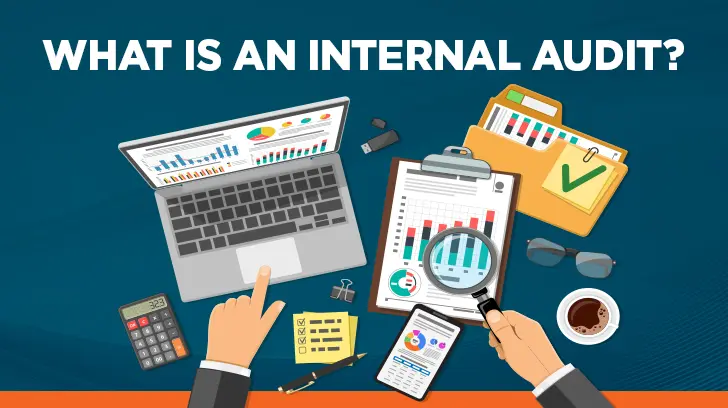
An internal audit is an independent, objective assurance and consulting activity designed to add value and improve an organization’s operations. It involves systematically examining and evaluating a company’s internal controls, governance processes, risk management, and compliance with laws and regulations.
Internal auditors assess the effectiveness of these processes, identify potential areas of improvement, and provide recommendations to enhance efficiency, prevent fraud, and ensure accurate financial reporting. Unlike external audits, which are conducted by outside parties, internal audits are performed by employees or teams within the organization to support management in achieving organizational goals.
The Importance of Internal Audits
Internal audits offer several benefits to organizations, enhancing their overall efficiency, governance, and risk management. They are important for the following reasons:
- Risk Management: Internal audits help identify potential risks within the organization, allowing you to take proactive measures to mitigate them. This ensures that your company is better prepared for uncertainties.
- Improved Control Processes: By evaluating the effectiveness of internal controls, internal audits can highlight areas that need improvement. This helps strengthen your control environment, reducing the likelihood of errors and fraud.
- Operational Efficiency: Internal audits assess the efficiency of your operations. By identifying inefficiencies and recommending improvements, audits can lead to cost savings and better resource utilization.
- Compliance Assurance: Internal audits ensure that your organization complies with relevant laws, regulations, and industry standards. This reduces the risk of non-compliance penalties and legal issues.
- Strategic Planning Support: By providing insights into the effectiveness of your current strategies and operations, internal audits help guide decision-making and strategic planning. This ensures that your organization remains aligned with its goals.
- Enhanced Financial Accuracy: Regular internal audits can detect discrepancies in financial reporting, ensuring that your financial statements are accurate and reliable. This builds trust with stakeholders and investors.
- Fraud Prevention: Internal audits play a crucial role in detecting and preventing fraud by monitoring transactions and reviewing internal controls. This safeguards your organization’s assets and reputation.
- Continuous Improvement: Internal audits provide ongoing feedback and recommendations, promoting a culture of continuous improvement within your organization. This helps maintain high standards and drives long-term success.
By leveraging these benefits, internal audits can significantly contribute to the stability, growth, and sustainability of your organization.
Internal Audit vs. External Audit
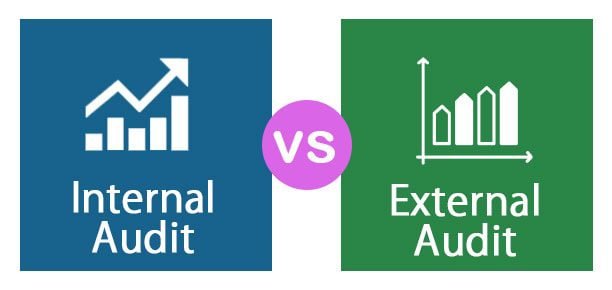
Internal and external audits differ primarily in their purpose, scope, and independence. An internal audit is conducted by a company’s own employees or an internal audit department, focusing on evaluating and improving internal controls, risk management, and operational efficiency. It serves as a tool for management, offering ongoing insights to enhance processes and ensure compliance with internal policies.
In contrast, an external audit is performed by independent external auditors from outside the organization, primarily to provide an objective evaluation of the financial statements’ accuracy and fairness. While internal audits are more flexible and continuous, external audits are mandatory and focus on assuring stakeholders, such as investors and regulators, that the financial reports comply with accounting standards and legal requirements. Both types of audits play crucial roles in strengthening an organization’s governance and accountability.
Who is an Internal Auditor & Key Roles

An internal auditor is a professional within an organization responsible for evaluating and improving the effectiveness of risk management, control, and governance processes. They work independently within the company, providing management with insights and recommendations to enhance operations and ensure compliance with policies and regulations.
Key roles of an internal auditor include:
- Risk Assessment: Internal auditors systematically identify and assess potential risks that could threaten the organization’s goals. They provide insights into these risks and recommend strategies to mitigate them, helping to safeguard the organization’s future.
- Evaluating Internal Controls: They review and test the effectiveness of internal controls to ensure they are functioning as intended. This process helps to prevent errors and fraud while ensuring the reliability of financial reporting and operational processes.
- Compliance Monitoring: Internal auditors ensure that the organization complies with relevant laws, regulations, and internal policies. By monitoring compliance, they help to avoid legal penalties and maintain organizational integrity.
- Operational Review: They analyze business operations and processes to identify inefficiencies or areas for improvement. Their goal is to enhance productivity and streamline operations, leading to better overall performance.
- Fraud Detection and Prevention: Internal auditors are vigilant in detecting and investigating potential fraud or unethical practices. They implement measures to prevent such occurrences and protect the organization’s assets.
- Reporting and Advising: They communicate their findings and recommendations to management and the board’s audit committee. Their internal audit reports provide valuable insights that support informed decision-making and strengthen governance practices.
In essence, internal auditors help ensure that the organization operates efficiently, complies with regulations, and maintains strong internal controls.
Types of Internal Audits
Internal audits come in various types, each focusing on different aspects of an organization’s operations and control environment. Here are some common types of internal audits:
1. Compliance Audit:
This audit is focused on verifying whether an organization adheres to applicable laws, regulations, and internal policies. It involves reviewing practices and procedures to ensure they align with legal requirements and industry standards. Compliance audits are essential for mitigating the risk of legal penalties and ensuring that the organization operates within the boundaries of regulatory frameworks.
2. Environmental Audit:
Environmental audits evaluate the organization’s environmental practices and compliance with environmental regulations. They assess the impact of the company’s operations on the environment, including waste management, energy usage, and pollution control. This audit helps identify areas for improvement in sustainability practices, ensuring that the organization minimizes its environmental footprint and adheres to environmental laws.
3. Security and Technology Audit:
This type of audit assesses the effectiveness of an organization’s information security measures and technology systems. It involves evaluating IT infrastructure, data protection protocols, and cybersecurity practices to ensure that they are robust and aligned with organizational policies and industry standards. Security and technology audits are crucial for protecting sensitive information and maintaining system integrity.
4. Performance Audit:
Performance audits focus on assessing the efficiency and effectiveness of specific programs, projects, or operations. They analyze how resources are utilized, whether objectives are met, and the overall impact of activities. By identifying areas where performance can be improved, these audits help organizations optimize operations and achieve better results.
5. Financial Audit:
Financial audits examine the accuracy and reliability of an organization’s financial statements and reporting processes. This audit ensures that financial records are complete and comply with accounting standards and regulations. Financial audits provide assurance to stakeholders that the financial statements present a true and fair view of the organization’s financial position and performance.
6. Operational Audit:
Operational audits evaluate the efficiency and effectiveness of various operational processes within the organization. They review workflows, resource utilization, and internal controls to identify inefficiencies and areas for improvement. The goal is to enhance overall operational performance and effectiveness, ensuring that the organization runs smoothly and efficiently.
7. Construction Audit:
This audit is specific to construction projects and focuses on reviewing compliance with contractual terms, cost control measures, and project management practices. It ensures that construction projects are executed according to specifications, within budget, and on schedule. Construction audits help manage project risks and ensure the successful completion of construction endeavors.
8. Special Projects and Investigations:
These audits are conducted for specific issues or projects that require detailed examination. They often involve investigating allegations of fraud, misconduct, or other unusual activities. Special projects and investigations provide in-depth analysis and evidence, supporting management decisions or legal actions and addressing particular concerns that arise within the organization.
Each type of internal audit plays a critical role in maintaining and enhancing an organization’s governance, risk management, and operational effectiveness.
What is the Internal Audit Process
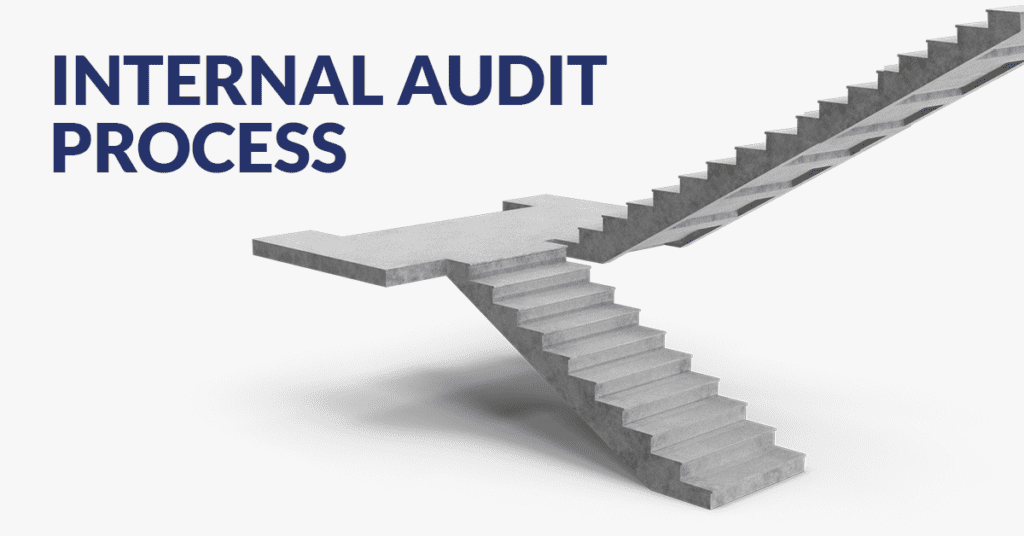
The internal audit process involves several systematic steps designed to evaluate and improve an organization’s internal controls, risk management, and governance. Here’s an overview of the key stages in the internal audit process:
1. Planning:
This initial phase involves defining the scope and objectives of the audit. The internal audit team develops an audit plan and internal audit checklist based on risk assessments, organizational priorities, and regulatory requirements. They identify the areas to be audited, allocate resources, and establish timelines.
2. Preliminary Assessment:
The auditors conduct a preliminary assessment to gain an understanding of the area under review. This internal audit function includes reviewing relevant documentation, understanding processes, and identifying key risks and controls. The goal is to identify significant risks and determine the focus of the audit.
3. Fieldwork:
During this phase, auditors perform detailed testing and analysis based on the audit plan. They collect and examine evidence, conduct interviews, and review records and processes. Fieldwork involves evaluating the effectiveness of internal controls, identifying any weaknesses or inefficiencies, and assessing compliance with policies and regulations.
4. Analysis and Evaluation:
After gathering data, auditors analyze and evaluate the findings. They assess whether the controls in place are adequate and effective and whether any issues or deficiencies have been identified. This phase involves comparing findings against best practices, regulations, and internal policies.
5. Reporting:
The auditors compile their findings into a comprehensive internal audit report. This report includes an overview of the audit scope, methodology, key findings, and recommendations for improvement. It provides management with actionable insights to address identified issues and enhance internal controls and processes.
6. Follow-Up:
Following the audit, the internal audit team monitors the implementation of recommended actions. They review whether management has addressed the issues identified in the audit report and assess the effectiveness of corrective measures. This follow-up ensures that improvements are made and that issues are resolved.
7. Communication and Review:
The final phase involves communicating the results and outcomes of the audit to relevant stakeholders, including senior management and the board of directors. The audit team reviews the process and outcomes to ensure that objectives have been met and to identify opportunities for enhancing future audits.
The internal audit process is iterative and ongoing, aiming to continuously improve organizational processes, risk management, and compliance.
Common Pitfalls in Internal Audit
Internal audits are crucial for maintaining effective controls and governance, but several common pitfalls can undermine their effectiveness. Here are some typical challenges and how they might impact the audit process:
- Lack of Clear Objectives: Without well-defined objectives, an internal audit may lack focus, leading to incomplete assessments or irrelevant findings. Clear, specific goals help ensure that the audit addresses critical areas and delivers actionable insights.
- Inadequate Risk Assessment: Failing to conduct a thorough risk assessment can result in audits that overlook significant risks. A comprehensive risk assessment is essential for identifying high-priority areas and ensuring that the audit is relevant and impactful.
- Insufficient Resources: Limited resources, such as time, budget, or skilled personnel, can constrain the audit’s scope and effectiveness. Adequate resourcing is necessary to perform a thorough and accurate audit, including the allocation of appropriate expertise and time.
- Scope Creep: Allowing the scope of an audit to expand beyond its original objectives can lead to confusion and diluted focus. Maintaining a clear and manageable scope helps ensure that the audit remains on track and addresses key areas effectively.
- Poor Communication: Ineffective communication between auditors and management can result in misunderstandings or misinterpretations of findings. Clear and ongoing communication is crucial for ensuring that audit results are understood and acted upon appropriately.
- Inadequate Follow-Up: Failing to follow up on audit recommendations can result in unresolved issues and persistent weaknesses. Effective follow-up is essential to ensure that corrective actions are implemented and that improvements are sustained.
- Overlooking Systematic Issues: Focusing solely on specific problems without addressing underlying systemic issues can lead to recurring problems. Identifying and addressing root causes helps prevent similar issues from arising in the future.
- Lack of Independence: If internal auditors lack independence from the areas they are auditing, their objectivity may be compromised. Ensuring auditor independence is crucial for maintaining the integrity and credibility of the audit process.
- Inadequate Documentation: Poor documentation of audit procedures and findings can undermine the audit’s credibility and usefulness. Comprehensive documentation is important for supporting findings, recommendations, and subsequent reviews.
- Resistance from Auditee: Resistance or lack of cooperation from the audited departments can hinder the audit process. Building strong relationships and fostering a culture of transparency and collaboration can mitigate this issue.
Professional Standards in Internal Audit
In the UAE, internal auditing practices are guided by a combination of international standards, local regulations, and industry best practices. Key professional standards for internal auditing in the UAE include:
1. International Professional Practices Framework (IPPF)
The IPPF, developed by the Institute of Internal Auditors (IIA), establishes global standards for internal auditing. It includes Standards that dictate the necessary independence, objectivity, and proficiency required for effective audits. These standards outline the scope, performance, and reporting requirements for internal audits.
The Code of Ethics within the IPPF sets forth essential principles like integrity, objectivity, confidentiality, and competency, which guide auditors in maintaining high ethical standards. Additionally, the Guidance component provides practical resources such as practice advisories and guides, which assist auditors in applying the standards effectively and addressing new challenges in the field.
2. Federal Law No. 2 of 2015
Federal Law No. 2 of 2015, also known as the UAE Commercial Companies Law, governs corporate practices in the UAE. It mandates that companies establish robust internal control systems to ensure accurate financial reporting and operational efficiency.
The law also requires the formation of audit committees responsible for overseeing financial integrity and ensuring compliance with regulatory standards. By enforcing these requirements, the law aims to promote transparency and effective corporate governance within UAE companies.
3. Securities and Commodities Authority (SCA) Regulations
The Securities and Commodities Authority (SCA) oversees UAE’s financial markets and enforces regulations for listed companies. These regulations require companies to implement strong internal control systems and conduct regular internal audits.
The focus is on maintaining financial transparency and accountability, ensuring that companies adhere to rigorous standards for internal controls and financial reporting. The SCA’s regulations aim to safeguard investor interests and promote confidence in the financial markets.
4. Dubai International Financial Centre (DIFC) Regulations
In the Dubai International Financial Centre (DIFC), entities must adhere to specific regulatory requirements set forth by DIFC Law No. 1 of 2009 and related regulations. These requirements include maintaining effective internal controls and conducting regular internal audits.
The DIFC regulations ensure that companies within this financial free zone follow high standards of financial and operational governance, integrating both local and international best practices to enhance transparency and accountability.
5. COSO Framework
The COSO Framework provides a comprehensive approach to internal controls and risk management. The Internal Control-Integrated Framework offers a structured method for evaluating the effectiveness of internal controls across various organizational processes.
The Enterprise Risk Management (ERM) Framework helps organizations identify, assess, and manage risks in alignment with their strategic objectives. Together, these frameworks support organizations in improving their control environments and integrating risk management with overall governance and strategic planning.
Why Choose Tulpar for Internal Audit Services
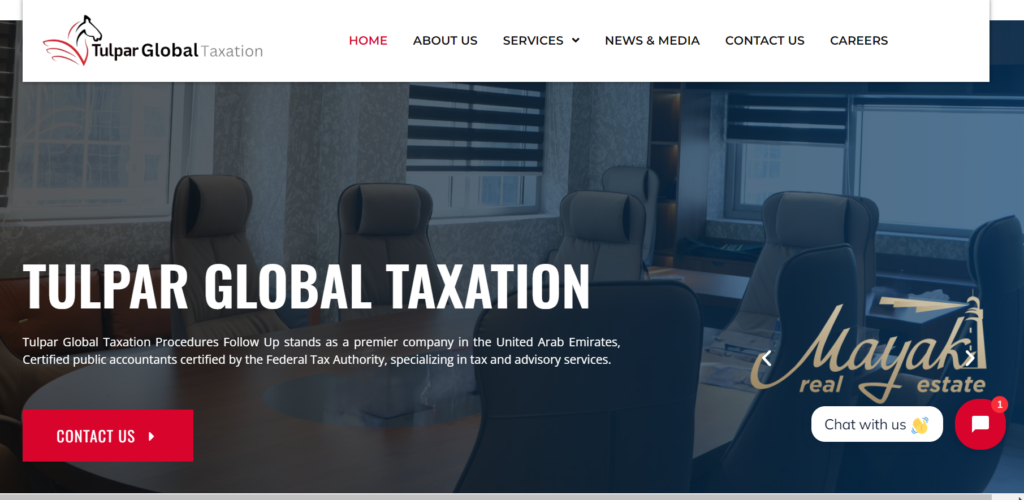
At Tulpar Global Taxation, we are dedicated to enhancing your organization’s governance and risk management through our comprehensive internal audit services. Our team of experts is committed to delivering high-quality, tailored audit solutions that address your specific needs and help you achieve operational excellence.
Expertise: Our audit team is comprised of certified professionals with extensive experience in internal auditing, risk management, and compliance. Their deep knowledge and practical skills ensure thorough and insightful assessments that effectively address all aspects of your organization’s internal controls and financial practices.
Independence: We pride ourselves on maintaining independence in our auditing processes. Our auditors provide impartial and unbiased assessments, ensuring the integrity and reliability of our findings. This objectivity is crucial for fostering trust and ensuring accurate evaluations.
Customized Approach: Understanding that each organization has unique requirements, we tailor our audit services to align with your specific needs, industry standards, and strategic objectives. This customized approach ensures that our audits are relevant and actionable, effectively addressing key areas of risk and compliance.
Timeliness: We are committed to delivering timely results while maintaining the highest standards of quality and rigor in our assessments. Our efficient methodologies and dedicated team ensure that you receive valuable insights within the agreed-upon timelines.
Confidentiality: Protecting your sensitive financial data is a priority for us. We uphold strict confidentiality standards throughout the audit process to ensure that your information remains secure. Our commitment to confidentiality reinforces the trust you place in our services.
Elevate your organization’s governance and risk management with Tulpar Global Taxation’s Internal Audit Services. Contact us today to discuss how our expertise and tailored approach can strengthen your internal controls and support your operational excellence.
Contact Us:
- Website: www.tulpartax.com
- Email: info@tulpartax.com
- Phone: +971-54 444 5124